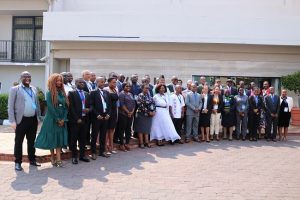Chair of the African Group of Negotiators on Climate Change (AGN), Ephraim Mwepya Shitima, has called for African countries to put in place measures to encourage active participation of legislators in climate action.

Mr. Shitima notes the important oversight role that Parliaments play in policy making and implementation through their legislative and oversight mandates such as approval and monitoring of national budgets.
“Under the Paris Agreement, Parties have made commitments through Nationally Determined Contributions. These national commitments require resources, and our Parliamentarians are critical as they not only approve national budgets but also provide the oversight role of monitoring budget performance and implementation.
“As AGN, we therefore believe that our law makers across the continent must actively be involved in climate processes. We are grateful to partners such as AGNES for their initiative to engage our parliamentarians, and welcome efforts from other partners to get law makers involved,” said Mr. Shitima.
According to the African Group of Negotiators Experts Support (AGNES), despite their critical role, parliaments in Africa are least prepared to effectively participate and play their oversight role on implementation of climate response actions.
While legislation has a crucial role to play by capturing political momentum and establishing strong systems to drive delivery of the desired national and international climate commitments, only a few countries in Africa have so far put in place relevant climate change legislation (Kenya, Nigeria and Uganda).
Similarly, Parliaments have a fundamental role in budget approval (public expenditure and revenue-raising) decisions and holding government to account.
“However, in most countries, there is very little relationship between the NDCs and the national budgets, yet most countries have indicated in their NDCs domestic financing contribution in the implementation of their NDCs,” notes George Wamukoya, AGNES Team Lead. “It is against the foregoing that AGNES has been convening regional parliamentary meetings to engage law makers and raise awareness on their critical role in supporting climate action at international, regional, national and local levels.”
After the regional parliamentary meeting for West Africa held earlier in the year, the latest meeting to be convened is the Southern African regional meeting, which opened in Gaborone, Botswana, on September 25, 2023, organised in collaboration with the Ministry of Environment and Tourism of Botswana, United Nations Development Programme (UNDP) Botswana, the African Union Development Agency (AUDA-NEPAD) and other partners.
Officially opening the meeting, Botswana’s Acting Minister of Environment and Tourism, Mabuse Pule, said climate change legislation must be part of a larger policy framework that supports equitable, sustainable, and inclusive development.
“Climate change action presents numerous significant challenges for legislators,” said Pule. “For starters, this phenomenon is inextricably tied to a wide range of other challenges and development goals. Climate change will have an extreme and long-term influence on agriculture, food production, energy availability and production, health and water security, to name a few. As a result, climate change legislation must be part of a larger policy framework that supports equitable, sustainable and inclusive development.”
In recent years, the international response to climate change has become increasingly elaborate and prominent, requiring countries to prepare, communicate and maintain a five-year-cycle of nationally determined contributions (NDCs). Countries are thus encouraged to align NDCs with their long-term low greenhouse gas emission and climate resilient development strategies (LTSs).
And this was a point emphasised by United Nations Development Programme (UNDP), Resident Representative for Botswana, Balázs Horváth, who also highlighted the importance of Africa’s unified voice as the continent prepares for COP28.
“This workshop has come at an opportune moment, when the international community is preparing for COP 28…and the importance of articulating a common African voice at COP28 and arguing for allocation of responsibility for financing the transition toward a net-zero world according to each country’s share in cumulative GHG emissions to date,” said Horváth.
Speaking earlier, Dr. Unity Dow, Chair of the Botswana Parliamentary Committee on the Environment, highlighted some of the climate change vulnerabilities that the Southern African region faces, and the need for law makers to be actively involved at all levels.
“The SADC region is extremely sensitive to climate change impacts…floods and other natural disasters continue to plunge more people into poverty. This will require our capacities as legislators to adopt necessary legislative and administrative measures to enhance adaptation and advocate for financial and technical support from different sources to advance climate action,” said Dr. Dow.
The SADC Parliamentary meeting on Climate Change has brought together Chairs of Parliamentary Committees responsible for climate change, Chairs of Parliamentary Committees responsible for agriculture, parliamentary staff supporting the parliamentary committee responsible for climate change matters and other relevant resources persons.
“We are aware of the frequency and magnitude of climate risks including tropical cyclones in within the region. This has a cost on our people and the economy. Therefore, as MPs, you have a responsibility to our people. We hope this is the beginning of our conversation and assure you of our readiness to support and work with you,” concluded Dr. Geroge Wamukoya.
